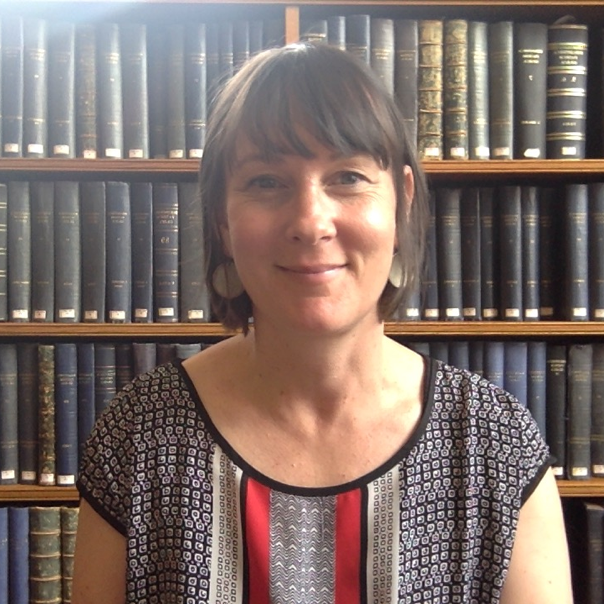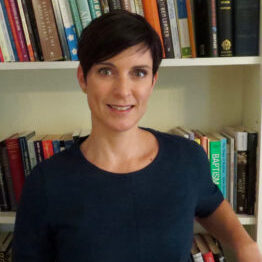Episode Transcript
[00:00:00] Speaker A: Foreign.
[00:00:05] Speaker B: You're listening to by the well, a lectionary based podcast for preachers recorded on the land of the Wurundjeri people.
Hello. This is the episode for the ninth week of the Pentecost season and we're going to be discussing Isaiah, chapter 1, verse 1 and 10 to 20, Hebrews 11, 1, 3 and 8, 16, and Luke 12, 32, 40.
I'm Robyn Whitaker and joining me today is a special guest all the way from America, Dr. Crystal Clavel, who is a Hebrew Bible scholar and a religious ethicist and an ordained Disciples of Christ minister, amongst many other things, and a friend from Chicago. So welcome. Crystal.
[00:00:55] Speaker A: Hi. I'm so happy to be here.
[00:00:57] Speaker B: Crystal, tell us, I don't know if you preach very much anymore. You mostly teach academically, but what kind of contexts have you preached in?
[00:01:05] Speaker A: Yes, I had a church for about a couple of. A couple of years and I would preach every week and I did sermons in hospital context, interestingly, as a chaplain.
[00:01:16] Speaker B: As a chaplain, yeah. Yeah. So that would raise its own particular issues and themes, I guess.
[00:01:22] Speaker A: Definitely.
[00:01:23] Speaker B: Yeah.
So we're going to start with Isaiah or Isaiah, as I think Americans say.
[00:01:30] Speaker A: Isaiah.
[00:01:31] Speaker B: We do have American listeners, so. Yep.
What do we need to know about the context of this? What's going on in, in the, you know, the setting of writing this?
[00:01:42] Speaker A: Right. Isaiah is really an interesting text because it's three texts rolled into one. You've got first Isaiah, which is chapters one through 39, and then you have second Isaiah, which sometimes called Deutero Isaiah, chapters 40 through 55. Some people will say it goes to 56, and then third Isaiah 56 to 66.
And so here we are right at the beginning with the actual prophet named Isaiah, for whom the other two sets of prophets, the second and the third, sort of participate in his school and his reputation.
But we're in about the 8th century BCE here at the beginning, and there's some tumult and it's pre exilic. So once we get to chapter 40, we're definitely in the exile. But right now it's pre exilic and there's time to turn things around instead of what you get.
[00:02:42] Speaker B: Great, that's helpful.
I'm always fascinated. This starts with the vision of Isaiah. And then we get, you know, some other names. It's concerning Judah and Jerusalem.
Is it right to think that that's the kind of southern kingdom or is that really a coverall for all of Israel?
[00:03:00] Speaker A: Yeah, I'm thinking it's mainly the southern kingdom.
[00:03:04] Speaker B: Yep. Yeah.
And the language of vision is interesting because we will get visions, famously in chapter six. And we think of prophets who kind of see God, maybe get a glimpse of the heavenly realm or they see God in symbols on earth.
And yet what follows is words.
So I'm, I'm always struck like maybe part of what Isaiah is seeing is actually the reality of life in this world, not some future. Right. How do we think about vision and prophecy and.
[00:03:35] Speaker A: Yeah, I mean, I think I'm gonna talk about it just a language level first and then we can sort of build on that. But the word hazon mean a vision is similar to something like a revelation.
And we do like to think of it as seeing versus hearing.
And I think it's individualized. You know, seeing is individual and hearing is communal.
So part of the prophet's role is to take a kind of understanding that he generally he has and make it available to a more communal group. And that means taking it out of a visual register where it's solitary and unitary and putting it into a register that more people can participate in. So we get the, the hearing register. Yeah, that's sort of how I think about the.
[00:04:33] Speaker B: Yeah, that's helpful in particular. Yeah. And moving from that individual to the, to what the community needs to hear and then respond to. Yep. So let's get into the text. Are there any particular things you noticed, exegetical or translation issues we should be attentive to in making sense of this?
[00:04:52] Speaker A: I think like right away I'm grabbed by the Sodom and Gomorrah citation in the text and thinking like, oh, this is, this is interesting.
[00:05:03] Speaker B: What's been invoked there?
[00:05:04] Speaker A: Yeah. What is the reference? And if you just keep reading the text, you get that the reference seems to be more of a social justice or injustice theme rather than any kind of sexual purity themes that have sort of glommed on to the interpretation of Sodom and Gomorrah.
[00:05:22] Speaker B: Yeah, I think particularly in Christianity when we hear Sodom and Gomorrah or particularly Sodom, we're thinking of later, later developments that make that very much about certain kinds of sexual so called sins or and you know, one small story in Genesis, but in the, in the Hebrew Bible, Sodom just becomes a stand in for like a place of wickedness and injustice. Right. Like it's much broader than that.
[00:05:46] Speaker A: It is, and you see it in the book of Ezekiel as well. And. Yeah, and then we're getting it here. And then a little bit later we get the word abomination in English, which, for in Hebrew is to.
And that is the word used in Leviticus to talk about sexual impropriety, especially in Leviticus 18 and 22.
And so we're getting a reinterpretation of what that word can do.
[00:06:12] Speaker B: Yeah.
[00:06:13] Speaker A: That this is not about any particular kind of sex. It's about social justice and how you treat other people.
[00:06:21] Speaker B: Yeah. And in the context there in verse 13, it's that the bringing your. It's your incense. Your incense offering is the abomination. So, in fact, the thing that should be an act of worship and devotion, you know, a symbol of that has become an abomination because it's so removed from justice and sort of goodwill towards other people.
[00:06:42] Speaker A: Right.
[00:06:43] Speaker B: Yeah.
[00:06:43] Speaker A: It's a shocking turn, I think. Yeah, it is.
[00:06:46] Speaker B: It would be incredibly confronting for I think so many of us in the modern world are so.
So removed from any kind of sense of a sacrificial system. But these are core rituals in ancient Judaism that to call that.
It might be like saying, your communion's an abomination to me.
[00:07:07] Speaker A: Right, right.
[00:07:08] Speaker B: Like, this is a pretty big call out.
Yeah.
My sense here is that there's also lots of language of, you know, sacrifices, burnt offerings. We're getting the naming of rams and bulls and goats. These are all quite big sacrifices. I'm wondering if there's elements of wealth going on here.
You know, like, they're not the doves and the little things that poor people get to.
[00:07:33] Speaker A: They're not the grain offerings.
[00:07:34] Speaker B: Yeah, yeah. So these are, you know, and I don't think we should read this as a criticism of the sacrificial system per se, but rather of worship and sacrifice when it's been completely removed from justice and action the rest of the time outside of the ritual.
[00:07:56] Speaker A: Right. As if, you know, the religious ritual stands in for any other thing you might do in the world.
[00:08:01] Speaker B: Yeah.
[00:08:02] Speaker A: It would be helpful to another person. Right.
[00:08:03] Speaker B: Yeah, exactly. Yes. You get to make yourself. I mean, almost like a transactional idea. I've gone to church, or, you know, in this case, you know, Jewish worship. But if we translate this into a Christian context, this idea, I've gone to church, and therefore what I do the rest of the week, I've got my brownie points.
Nothing else matters. And there is a strand of Christianity that can think in those kinds of ways.
But.
[00:08:26] Speaker A: Yeah, yeah. And I think it's important to think about the reception history of this kind of.
This kind of text. Amos 5 is really the text that kind of gets received this way and interpreted as, oh, Jewish ritual is bad.
Yeah.
[00:08:44] Speaker B: Right.
[00:08:44] Speaker A: We have to move away from that.
When in fact, this is an internal critique.
[00:08:49] Speaker B: Yeah.
[00:08:49] Speaker A: And so if you're reading the text as part of your own religious tradition, then you need to think of the critique as internal and not external.
[00:08:58] Speaker B: Yeah, I like that. That's a very helpful way to think about it.
The text, I mean, it's interesting to me because it has elements of a kind of a lawsuit, like Israel is being accused of things. Right. I mean, they've got this relationship, the bits the lectionary skips over, talks about Israel as God's child.
Very familial kind of language, but are not behaving like it.
We again, get some super strong language in here of God actually saying, I will hide. I will not listen to your prayers.
I don't actually know, to be honest, what to do with that as a preacher, except that it.
It's maybe like the strongest expression the prophet could think of of saying God is displeased with you.
Yeah.
[00:09:45] Speaker A: I think when I was reading this, actually, the other text in Isaiah at some point too, I was thinking about the, the epistemology and the sort of metaphysic behind it, which I sort of locate in. In the book of Leviticus, mainly.
[00:10:02] Speaker B: Yeah.
[00:10:02] Speaker A: And in that context, you know, Israel and God are. They really have a relationship, and when part of it goes bad, then the other, the other entity is affected.
[00:10:14] Speaker B: Yes.
[00:10:15] Speaker A: Right. So they're tied together and no matter what happens to one, something happens to the other.
And I sort of see that playing out here too. Like God wants to hide from their prayers and that. That is pretty alarming language, actually.
But you know what else? Like, I, I think our later conceptions of God don't have God tied to people in the same way.
[00:10:42] Speaker B: Yeah.
[00:10:43] Speaker A: Like the way we talk about relationality is different.
[00:10:46] Speaker B: Yes.
[00:10:46] Speaker A: And so if God can't really get away from Israel because they're tied together, then maybe God's going to cover God's ears or something like that.
[00:10:56] Speaker B: It's almost like the child in the room who's like covering their ears and yelling out loud, I can't hear you. Not to.
You know. Yeah. Maybe God, like in relationships. Yeah. God can't really leave and that they're, they're. They're bound by covenant.
But yeah, God does not want to listen to the people because they're so clearly not listening. And we get that even in verse 18, which the NRSV has come. Now let us argue it out. I mean.
[00:11:22] Speaker A: Right.
[00:11:23] Speaker B: It's like, I think most of us don't think about arguing with God, that this is something we can do, we can have a debate.
Robert Alter's translation is Come pray, let us come to terms, which is an interesting. Which is quite lovely and which is more of a sense of let's find some resolution. I get. I guess.
And then it ends with this series of reversals.
[00:11:46] Speaker A: Right.
[00:11:47] Speaker B: Like sins that are framed as scarlet, red can be turned into snow.
You know, you can eat the good of the land or be devoured by a sword. Some pretty stark contrasts here before you. But there is a sense of consequence, but also a sense of possibility.
[00:12:06] Speaker A: I think there is possibility and possibly, possibly it's the possibility that is captured in my NRSV translation, which frames a couple of those as questions.
[00:12:17] Speaker B: Oh yeah.
[00:12:17] Speaker A: So in verse 18, if your sins are like scarlet, will they become like snow? Yeah, and I get the Alter doesn't really do that, does he?
[00:12:27] Speaker B: No, he has it. I mean, he uses the if. The if is there. If your offenses be like scarlet, like snow, shall they turn. Which is a more. And I think we were trying to look at the Hebrew before this.
The possibility to interpret that is there in the grammar. Right. So it might be interesting, if you're going to preach this text, to think about is do you want it to sound like a. An assured promise this will happen regardless, or is it a question that says that raises possibilities for people, but you, there's. You got to enter into those possibilities.
[00:13:01] Speaker A: Right. Is it an open ended question and you need to do something?
[00:13:05] Speaker B: Yeah.
Well, we might move on to Hebrews 11 and we'll pick up some of these threads towards the end.
Now this is such a famous passage in Hebrews in this language of pistis, of faith, or you can translate that belief, even trust in the assurance of things hoped for and the conviction of things not seen. The author here is playing with kind of a number of dualisms that are typical in Greek thought. So that which is seen and unseen, invisible, the visible, the heavenly, the earthly.
And in that kind of philosophical worldview, often it is the heavenly or spiritual that is a higher ranked thing.
So we've got some of that going on here.
And the example of Abraham, there's lots of examples, but the lectionary gives us one that starts with by, by faith, Abraham. So I think there's ways to really map this out as a very practical kind of example of what faith makes possible when we live with trust. So I quite like faith, this pistis word translated as trust, because it's.
It's not faith in God in the sense of Belief doctrinally in a set of things. It's actually about living in a way where your trust in God is so.
Yeah.
Thorough. I don't know, it's a better word. I mean, it's not perfect, it's never perfect.
But that you, you can so deeply trust in God that you can live in a way that, that reshapes your life. I think that's the kind of idea of faith going on here.
[00:14:55] Speaker A: Yeah, I think that lines up interestingly with a way you can interpret Abraham. Right.
[00:15:01] Speaker B: Yeah.
[00:15:02] Speaker A: There's so many interpretations of Abraham. Yes, but his, his life was reshaped.
[00:15:07] Speaker B: Yeah.
[00:15:08] Speaker A: By that, by faith.
[00:15:10] Speaker B: And he left this land, left behind family and his kin.
And we get these big movements that are referred to in here. You know, he lived in a foreign land in tents, but he's looking towards the city. And I think the city imagined here is ultimately a heavenly city.
Later in Hebrews, in chapter 12, we get reference to Mount Zion, but referred to as heavenly Jerusalem. So we're not talking a literal place in Israel.
And we get this movement of Abraham and Sarah's lack of children towards children that will form a nation. So this movement from a sense of nothingness or loss towards fruitfulness and flourishing.
And this is all the kind of movement of where trusting God can lead us.
[00:16:00] Speaker A: Yeah, because we're reading it with Isaiah 1, it seems like the reversals at the end that passage are a good mirror.
[00:16:09] Speaker B: Yeah, I think the movement is the same and it's talking about the promises and this sort of stuff. And I mean, maybe if you're going to put these two texts together as a preacher, it's, you know, one of the things I hear so often in churches is this almost putting the New Testament against the Old Testament.
But in fact here, you know, the. They're using very different language and sets of metaphors, but we've got two texts that are talking about the possibility of transformation that comes through a life of living with God. Well, and I think the movement is the same and the ultimate promise is the same in both towards like flourishing and justice and for everybody.
[00:16:50] Speaker A: Yeah. And that justice that we could all see would in fact be evidence of this transformation.
[00:16:56] Speaker B: Yeah, that's right.
So again, it's not about your worship or your spirituality. This is tangible.
Yeah. Lived out faith.
So we're not going to dwell on that because we're going to try and flip over now to Luke 12, a fun and tricky text, verses 32 to 40.
Did you know you could join our Facebook group by the well for extra Content and discussion.
Where do we want to start, Crystal?
[00:17:28] Speaker A: Well, I was hoping you would explain the text to me in full.
[00:17:31] Speaker B: Sure. That's not going to happen.
We're in this sort of slightly funny part of Luke where we're getting a lot of Jesus sayings.
So just before this, we've had teaching to the disciples in. In 1222. It's clearly addressed to his disciples, telling them not to worry about what they eat, about their basic physical needs, because God will take care of.
And. And so verse 32 is a continuation, at least in the way that Luke has arranged this, of this kind of, you know, wise teaching from Jesus towards his disciples.
And it probably helps to set this in the much wider Gospel of Luke, because Luke has a number of hard sayings about the demands of discipleship, and we get one of them in verse 33. Sell your position, possessions and give arms. Like the sense of give up everything for Christ.
But it's premised by that. Verse 32. Do not be afraid, little flock, for it is your Father's good pleasure to give you the kingdom. Like, it's almost like that is the framing, I think, for everything that follows, which is not that you earn the kingdom, but it is God's pleasure to give us the kingdom.
And. And so what follows is a way of living into that, which, again, I think actually reflects the kind of movement of Isaiah. Because you have this relationship, because you are my children, I expect you to live into these sorts of ways, not because you earn the relationship. The relationship's there.
[00:19:05] Speaker A: Right. The relationship's there and really can't be broken.
[00:19:08] Speaker B: That's right. Yep. Yep. God's on your side regardless. But there are some expectations perhaps about how to live.
Yeah. Is there anything you noticed in. I mean, and there's also kind of two or three clear sections here that, you know, there's the bit about arms and treasure, there's the bit about being watchful, and then we get a little apocalyptic towards the end. So I. I mean, my advice is don't try and make them all fit. This is like a series of sayings that if you look for an absolute logic, I don't think we're going to find it.
[00:19:42] Speaker A: Right. Yeah.
I think the thing that I was struck by thematically was just the belief in abundance.
Right.
[00:19:52] Speaker B: Yeah.
[00:19:52] Speaker A: Living out a fear of scarcity, either in the context of your relationship with God or with other people, does not set you up to live the way God would hope for you to live.
[00:20:06] Speaker B: Yeah.
[00:20:07] Speaker A: And I think it's really hard sometimes to not Think about scarcity first.
[00:20:14] Speaker B: Yeah.
[00:20:14] Speaker A: With one's own actions.
[00:20:16] Speaker B: Yeah. And both individually, because we all crave a certain kind of security, I think.
And cost of living is a real issue around the sort of Western world. I think certainly here in Australia.
I don't think other parts of the globe are immune to those dynamics. And so when we're under pressure, our. I think our tendency is to want to build more security.
Yes.
And we do that individually, we do that communally. With the church in decline, we. We want to kind of almost turn internally and hold on to what we've.
[00:20:56] Speaker A: Got instead of having a mission.
Yeah.
[00:20:59] Speaker B: And looking outwards. Yeah.
So I think there's a ton to play with here in terms of sell your possessions.
There are some people who would interpret these parts of Luke. He has many sayings like this as. As quite real. Like, you know, give up what you have, rely on God.
I think we do have to do some careful hermeneutical work around, you know, the balance of generosity and being sensible. But, you know, understanding we have multiple obligations in life.
But the framing of that in terms of heavenly treasure, I think for me is helpful in terms of just some very practical aspects of where your treasure is, your heart will be also the sense of where you spend all your time, the thing you're obsessed with getting is where your heart will focus. And if that's on the four bedroom home with swimming pool or climbing a certain ladder or whatever it is, I think this would challenge that and suggest you need to reorder your priorities in life.
[00:22:11] Speaker A: Yeah, I do too. And I think there are theories of religion that have been organized around a passage like this.
[00:22:17] Speaker B: Yeah.
[00:22:17] Speaker A: The idea that, well, everyone is religious whether they have a particular faith life or not, because everyone is worshiping something. So whatever your treasure is, is the thing that orients you.
[00:22:29] Speaker B: Yeah. And the thing that drives you and the thing that you maybe place your trust in.
[00:22:32] Speaker A: Yes.
[00:22:33] Speaker B: If we. Yeah, so if. Yeah, it might. And again, there might be a way therefore to connect this with what's going on in Hebrews. If our trust is in our financial security because of the decisions we've made, this is again challenging. That our ultimate trust actually needs to be in God.
Yeah, yeah.
[00:22:53] Speaker A: I also think there's an interesting contrast between Luke and Matthew, which you probably know better. But in our. The theological ethics class, we always made this a point to think about. You know, when theologians, are they citing Matthew, are they citing Luke?
Because you get some similar ethical ideals out of both of them. But the question is whether or not they really stick. And in Luke they're sort of directive and they stick.
[00:23:23] Speaker B: Yeah.
[00:23:23] Speaker A: And in Matthew, especially at the Sermon on the Mount, you get things like blessed are the poor in spirit.
And then there's an entire hermeneutical tradition that arises out of in spirit. Meaning that the poor are not necessarily blessed here on earth, but maybe later they are blessed.
[00:23:40] Speaker B: Yeah.
[00:23:41] Speaker A: And I think Luke really turns that around and says, no, what we mean is you take care of the poor here. They are important.
[00:23:50] Speaker B: Yes. And this is a theme throughout Luke. He is so concerned about the poor and the sharing of wealth and at times very critical of those who are wealthy and who are not sharing their wealth when there's poor people in their midst. So there's a very strong wealth arms giving ethic going on throughout the Gospel that this is consistent with the next. If we move to like verse 35, the next section, which can sit uncomfortably to modern ears. So the scenario Jesus is talking about here is of a master and slaves or servants is another way we can translate this Doulos language.
But he's reflecting a cultural reality in his world, which is people had servants or enslaved people in their households.
We've got, and I mean, there's layers to this.
It we're heading into sort of images we often associate with Advent and apocalyptic texts with having lamps lit. And we've got a master returning from a wedding banquet, which also functions in biblical literature as an image of, you know, that like the eschaton, you know, end times kind of banqueting, you know, this is part of God's promises. So we've got images associated with abundance and celebration, but also servants or slaves waiting and needing to be alert.
And then there's a flipping in verse 37 that is really quite shocking. And we can miss if the master comes and finds the slaves alert, he, the master will fasten his belt, which is an image of kind of literally kind of.
What's the word? Like gathering up your cloak so it's not going to get in the way so you're ready to serve. It might be like putting on an apron kind of thing. He'll fasten his belt and he'll have them sit down to eat and he, the master will come and serve them, the slaves. This is unheard of, right?
This is. I mean, maybe when Jesus said this, people might have laughed, you know, or, or scoffed or something in that it was such a ludicrous thing to imagine that a master would ever serve the slaves. I mean, the master wouldn't even have slaves sit at the Same table, let alone seven, but this. So if we frame this all with, you know, it's God's good pleasure to give you the kingdom.
This is one of the signs of the kingdom. This is the reversals we talked about in Isaiah, where the slaves are served by the master, where the lowest get the seats of honor at the table.
And this is again, consistent with Luke, whose gospel starts with Mary's, you know, magnificent cat, which is all about reversals and, you know, the captives going free and all those sorts of things.
Yeah.
[00:26:44] Speaker A: I wonder what it means to be alert.
[00:26:48] Speaker B: Yeah.
What do you think, Crystal?
[00:26:52] Speaker A: I mean, what does it mean for the servants to be alert?
Are they ready to serve?
Are they awake?
There is a watchful. Their lamps are lit. They're watchful. Yeah, yeah.
[00:27:05] Speaker B: So there's something about action, right? I mean, it says dressed for action and lamps lit. So there's something about being ready.
What that means in our world is interesting, like, are we ready for service? Are we ready to meet the needs of others when we see them?
Yeah, it's tricky, isn't it?
[00:27:29] Speaker A: It is tricky to bring that into our world.
[00:27:33] Speaker B: And the alertness.
One of the things I've been thinking about lately that is really just a thought mostly at the moment is at least here in Australia, before our last election, a lot of the Conservative Party were just going hard at the woke agenda. Like, wokeness has become a very lazy shorthand for a whole lot of stuff some people don't like.
And whenever I would hear that language, I would cringe because for me, as someone who reads a lot of apocalyptic texts, alertness, wakefulness, wokeness is absolutely a call of Christianity.
[00:28:10] Speaker A: Absolutely.
[00:28:11] Speaker B: Yeah.
[00:28:12] Speaker A: The Gnostics used it as well.
[00:28:14] Speaker B: Yeah, that's right. So for me, that. And I know that that language will be a trigger for some people. Some people just hate it because they associate it with certain things.
But that sense of being, well, woke is about being alert to injustice. It's about being alert to what's going on in the world.
And so the alertness, I think here we could probably interpret it in a couple of ways. One is very much about being alert to the coming of God in your life. So the Son of Man coming, the Master coming.
So being alert to what God is doing in your life so that you actually notice it, but it might also mean being alert to what's going on in your community and where there's suffering and injustice and oppression that we also should be paying attention to and doing something about.
[00:29:05] Speaker A: Yeah, I really like that.
[00:29:06] Speaker B: Which again, connects us back to Isaiah. Everything goes back to Isaiah. This week we're just going to go with that.
Any last thoughts, Crystal, as we wrap up about sort of what you would preach, what themes you seem.
What. Any themes that have sort of jumped out for you?
[00:29:24] Speaker A: I mean, I, in my US Context.
[00:29:27] Speaker B: Yeah.
[00:29:28] Speaker A: I would preach about religion and faith without ethical action.
You know, that, that, that is not what God has called us to.
That taking care of other people is deeply important.
[00:29:43] Speaker B: Yeah.
[00:29:45] Speaker A: And I mean, I think it's right there in these texts. I don't think you have to massage them into the message. I think there.
And I would probably take a pretty political orientation.
[00:29:59] Speaker B: Yeah. And I think that works here, too. I think, you know, we don't have sacrifices in the same way, but we have performances of public prayer and piety in both our contexts, not accompanied by ethical action towards the poor or whatever minority.
I mean, in the ancient texts it's orphans and widows, but we have other people now that might be more than marginalized and more at risk of being lost in our society. So, yeah.
[00:30:30] Speaker A: Yeah, that's what I would do.
[00:30:32] Speaker B: Thank you, Crystal Clavel, for being with us for by the World this week.
[00:30:36] Speaker A: Thank you. It was great.
[00:30:40] Speaker B: By the well is brought to you by Pilgrim Theological College and the Uniting Church in Australia. It's produced by Adrian Jackson. Thanks for listening.





